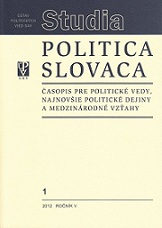Rok 1989 – čas prelomu a transformácie v Poľsku a v Československu
1989 – The turning point and time of transformation in Poland and Czechoslovakia
Author(s): Andrzej KobusSubject(s): Politics / Political Sciences
Published by: SAV - Slovenská akadémia vied - Ústav politických vied Slovenskej akadémie vied
Keywords: People’s Republic of Poland; Czechoslovakia; anticommunist opposition; system transformation; political reforms; the Velvet Revolution; the Polish-Czechoslovakian Solidarity
Summary/Abstract: The paper presents a comparative study of the political and social situation in Central Europe in 1989, which exerted great influence upon Poland and Czechoslovakia, two neighbours and leaders in that part of Europe. The article describes the positions of their political elites as being very different from each other in the first half of 1989. In Poland, the party and government leadership was inclined to intensify the started reforms, while Czechoslovakia was mostly affected by a conservative public opinion. It was the social crisis triggered by the Velvet Revolution of November 1989 that changed the state of affairs and forced Czechoslovakia to join the bloc of states that entered upon the transformation process of their existing systems. The article also broaches the subject of anticommunist oppositional circles whose contacts and planes of discussion expanded as the year 1989 progressed. The final part of the article is devoted to the oppositionist Václav Havel’s accession to presidency in Czechoslovakia as well as to the drastic changes introduced into the constitution of the People‘s Republic of Poland, which helped to put an end to this political formation.
Journal: Studia Politica Slovaca
- Issue Year: V/2012
- Issue No: 2
- Page Range: 63-75
- Page Count: 13
- Language: Slovak

